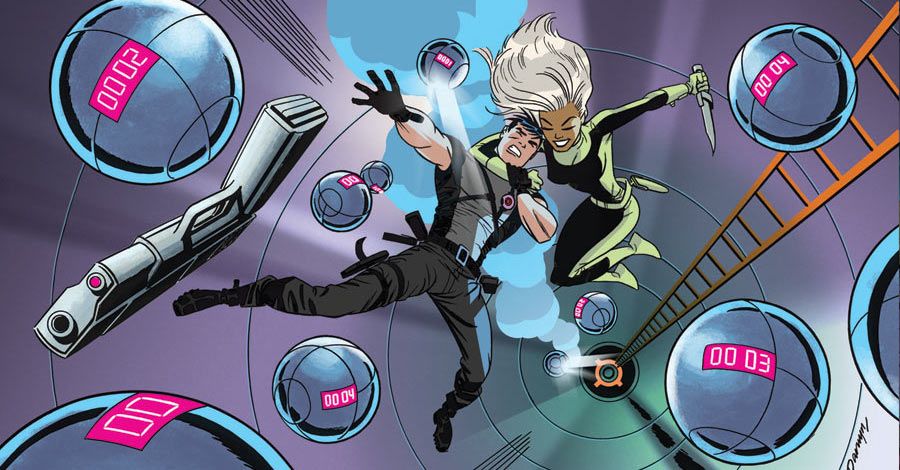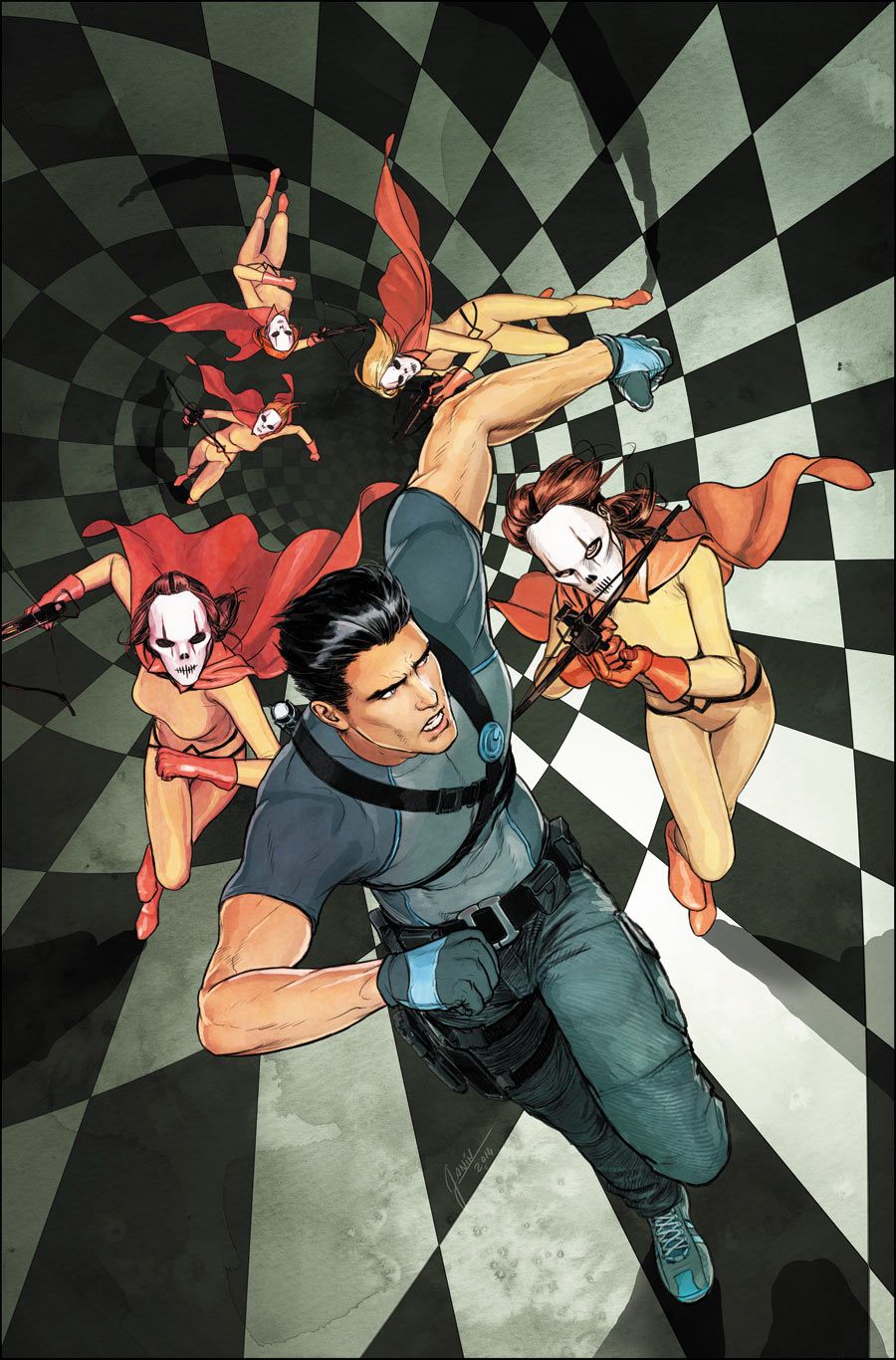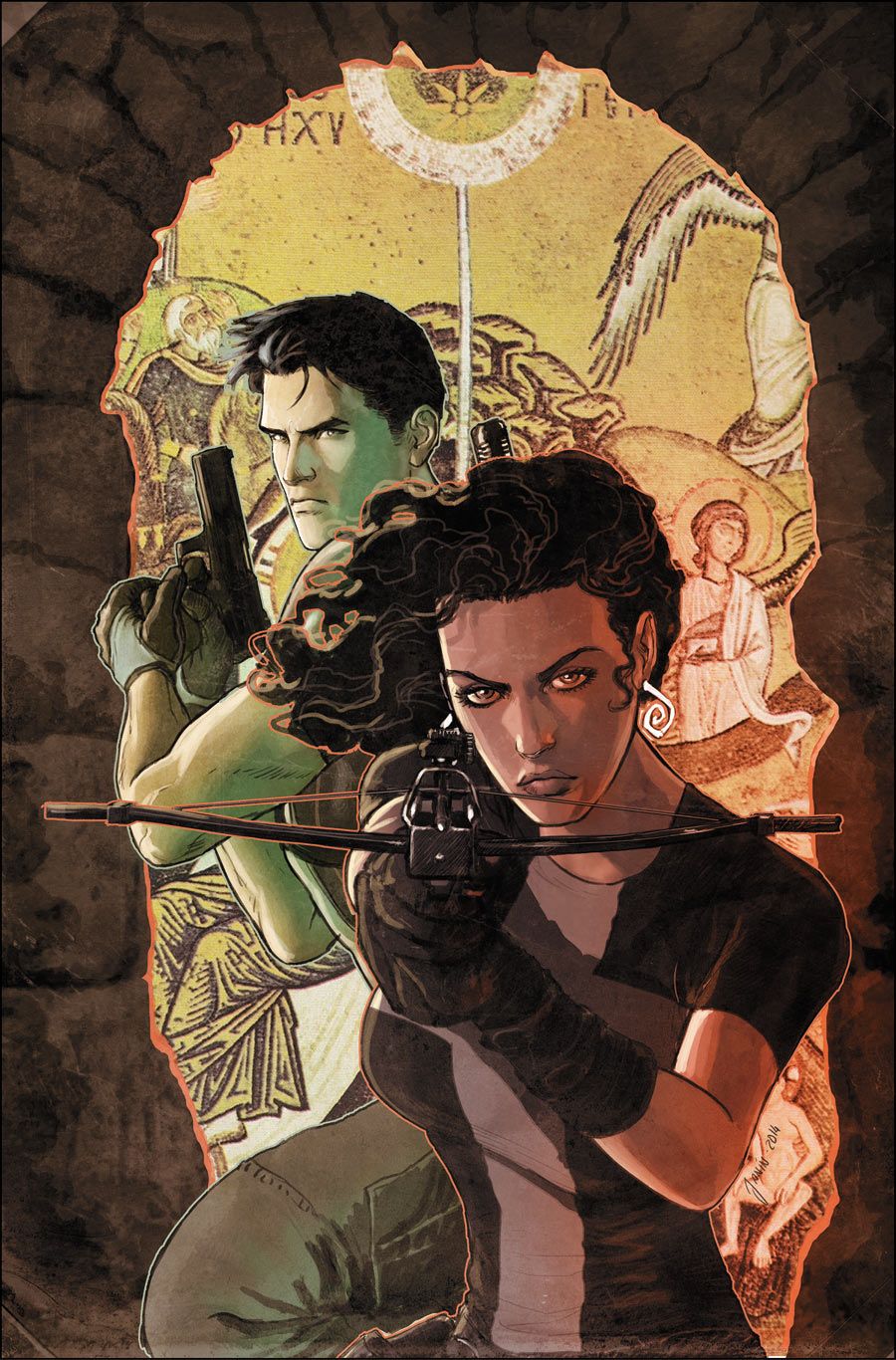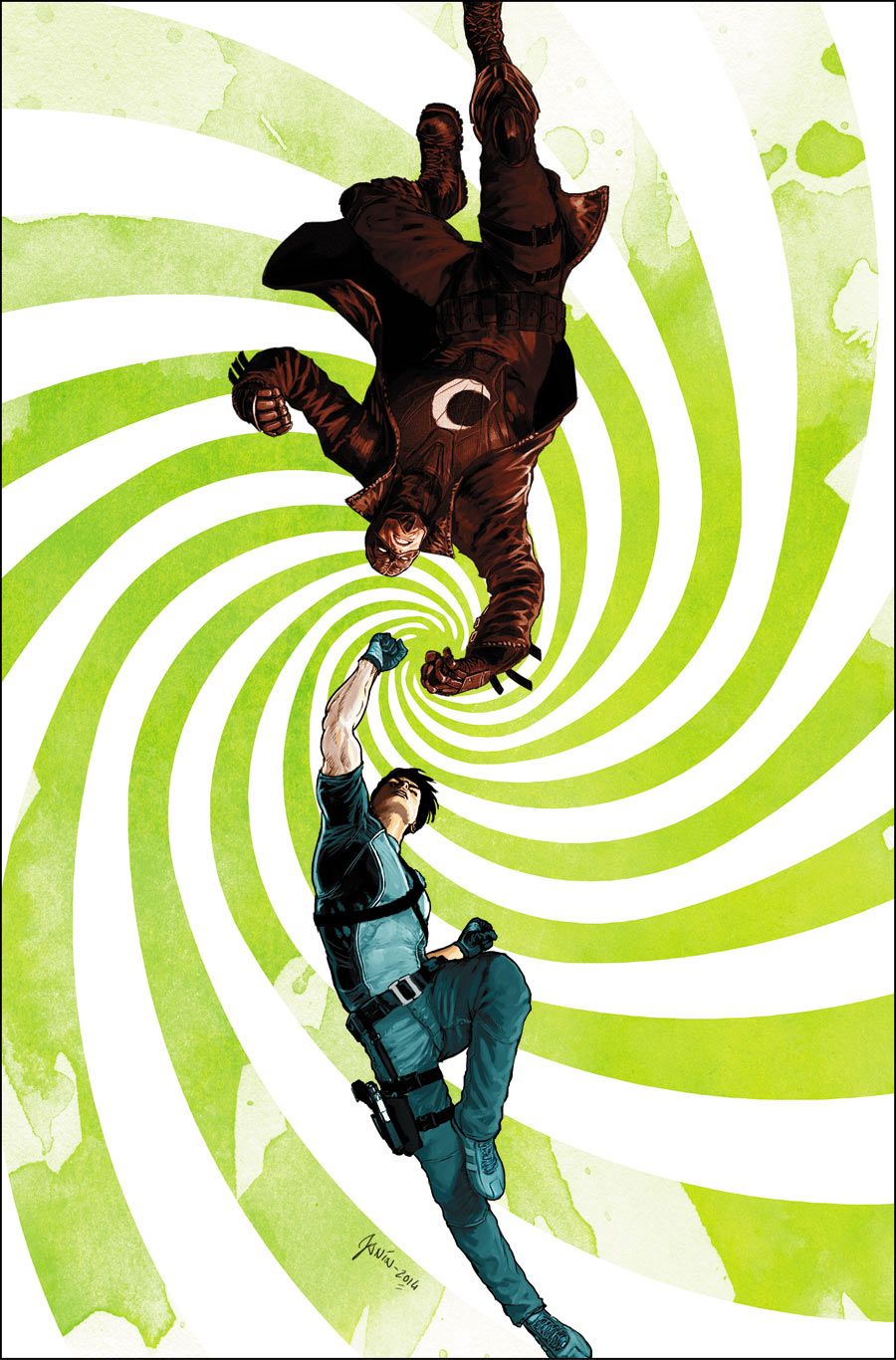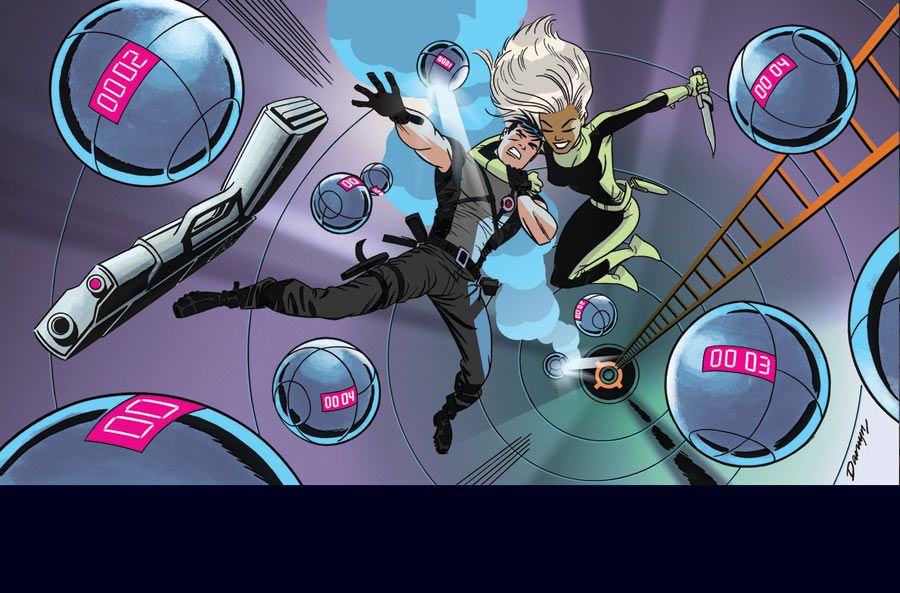DC Comics ongoing series "Grayson" sees former Robin and Nightwing Dick Grayson going undercover with the super spy organization Spyral without losing what makes him part of the Batman family. That pitch could almost serve as a metaphor for series co-writer Tom King.
A former CIA counter-terrorism officer turned novelist, King may seem like a new face to the comics industry. But as he told CBR, his arrival really marks a return to his roots more so than an infiltration. King previously worked behind the scenes in comics before moving on to government work, and both experiences factor heavily into "Grayson," which continues its opening "season" of mostly one-and-done stories with November's issue #4.
CBR TV: Tim Seeley on Guiding "Grayson" & "Batman Eternal"
CBR News discussed the ins and outs of his career and his work with "Grayson" writing partner Tim Seeley, and below King explains his own history as a comic pro, details the past Dick Grayson issues which will have an impact on incoming stories in his series, reveals what he can about how his CIA life informs the book and teases where the first season of story will go after a Helena-heavy annual.
CBR News: Tom, with the latest few issues you've stepped up to take over scripting duties on "Grayson" as the book has continued to get a good response from fans. What's the overall learning curve been like on your first big comics project?​
Tom King: Mercifully, I'm not coming into this completely cold. I interned at both Vertigo and Marvel in the late '90s. At Vertigo I got to see Garth Ennis tweak "Preacher" and Brian Azzarello pitch "100 Bullets." At Marvel I worked as comic genius Chris Claremont's assistant, and we'd go through and evaluate every script that was coming in then, comparing how Kevin Smith did something to how Roger Stern did it. After an odd excursion into the world of spies and terrorists, my first novel ("A Once Crowded Sky" from Simon & Schuster! Buy it! Buy it twice!) was about superheroes and was a combination of prose and paneled pages. I worked on that with Tom Fowler, one of the great contemporary cartoonists who basically put me through how-to-write-a-comic-page school. Now, I'm working with Tim Seeley and my editor Mark Doyle, both of whom are incredibly talented teachers at the art of comic writing.
That said, there have been some bumps in the curve. Probably the greatest challenge so far has been matching the beats in a script to the beats in a drawn, colored, and lettered comic. A script reads so slow compared to how fast a comic reads. Writing needs to take a breath sometimes, to calm in order to set up the surprise of the crazy. I'll see that calm in the script, then when I'm reading the comic, it magically disappears. I think when I'm writing, I sometimes make a stupid assumption that people will stare at the art for a bit then read the word on the page, and this isn't how comics essentially work: we absorb both simultaneously, which affects the beats.
As wide a reception as the series has had, I still think the readership is getting to know your voice as a storyteller. One thing that everybody noticed when "Grayson" was announced was your background with the CIA. Obviously, that's the kind of career that's hard to talk about in public (or maybe even impossible!). But even though the particulars of a spy book like this are wildly different from that real life work, I wondered if you could tell me how that background informs this series?
The CIA stuff is always a tricky subject. Basically, I'm never going to put anything about actual CIA sources and methods into my writing. There's not really a choice to it. People are still out there risking their lives under the assumption that those secrets will be kept.
That said, it's my responsibility as a writer to put myself into my work, and part of who I am is that experience. I was a nerd. I was a philosophy major. Then, like millions of people my age, after 9/11 I volunteered for a very strange fight against a very strange enemy. The emotions I went through in those years -- the lies I told, how scared I was, how brave I found everyone else to be -- will be on every page of "Grayson" and every other book I write.
And from a comics standpoint, what's your history like? How did you come up as a reader both when you were young and after you'd started your career as a novelist? Do you have any comics writers you've looked to for inspiration on "Grayson?"
My first comic was "Avengers" #300 (Gilgamesh!), which I got when I was about seven or eight, and I was insanely hooked. When I escaped the usual furies of a nerdy youth, I escaped into comic books. I learned how to ride a bike so I could ride one to the comic shop (Comics Ink in LA!). Now, my tastes were not that broad. They ran the spectrum from DC superheroes to Marvel superheroes. Like a lot of readers my age, I fell out of comics in the late '90s then returned in the early 2000s when the Bendis-Millar-Brubaker generation of writers injected incredible energy into the medium. At that time, I finally went out and read all the non-superhero comics I'd absurdly missed as a kid.
In terms of my comic influences on "Grayson," everything for me starts with Alan Moore and Frank Miller: in terms of quality and creativity in superhero comics, those two set a bar that I'm going to try my damnedest to get up to. I'll fail, but it'll be worth the fall. Grant Morrison's influence on the whole series is fairly obvious. Other writers I look to are Brian Michael Bendis, Louise Simonson, Charles Schulz, Art Spieglman, Naoki Urasawa, Ed Brubaker, Darwyn Cooke, Will Eisner, Peter David, George Herriman, Wendy Pini, Alex Robinson, Keith Giffen, John Ostrander and Kim Yale -- I could go on for basically ever, Those are just the ones whose work I keep by my desk. It is worth mentioning that the idea for the "Grayson: Futures End" backward issue was inspired by Peter David's "Star Trek Annual" #3 -- a great Scotty story. People should check it out.
Seeley, King Enter the DCU's Espionage World in "Grayson"
You've said a few places that Dick was always your favorite DC character thanks to his accessibility. With that in mind, what were the big stories that first brought you into his world? Are any of them the kind of thing you'll look to fold into the background of this book?
I came into DC comics with Tim being Robin and Dick being the ex-Robin, the man who had gone through that uniquely frightening experience and emerged as someone uniquely brave. I remember buying my first trade, "A Lonely Place of Dying," and obsessing over the Tim/Dick/Batman interaction. There was this essential question there about how do you leave childhood without losing who you were as a child. I read that thing to pulp. The first time I got to write my own complete script for the series, I titled it "Only a Place for Dying," as a tribute to that experience.
Some of my other favorite Grayson stories are:
"​Birds of Pray" #8 (the Barbara/Dick date issue), which is where Agent 8 from "Grayson" #3 gets her name; "Batman" #156 ("Robin Dies at Dawn"), which will play a role in an upcoming issue, and, probably my favorite Dick Grayson story of all time; "Secret Origins Annual" #3, which I haven't yet figured out how to squeeze story out of -- but I will! Dick Grayson has a 74-year history, and though "Grayson" is a book solidly set in the New 52 featuring a very modern take on the hero, that history will always be in the background and will always haunt and elevate our hero.
In terms of the nuts and bolts of the series, you and Tim Seeley have plotted out an opening 10-issue arc or "Season" already. But the title still has a very "one and done" feel with each issue serving up its own story. What does that single issue format offer you in terms of writing, and will the practice have to break down a bit as things start rolling towards #10?
Just like you said, the series starts with basically seven one and done issues ("Grayson" #1-5 plus the Annual and "Futures End"), all of them centered around the collecting of these Paragon organs. We wanted to focus in the beginning on Dick Grayson as super spy, show how he uses the skills he acquired as Nightwing and Robin in this new environment. It should be noted that these issues are one and dones with consequences. The characters and emotional moments of all of these issues will play out over time. After issue #5 you'll see some longer arcs as we start to explore the larger story of what exactly Spyral is and how it impacts Dick's life and the greater DCU.
As for one and dones, I love them as a reader and as a challenge to the writer. Every panel has to be used properly; every word balloon, every page turn has to serve the theme of the issue. Whenever I get frustrated that I don't have enough room to tell a story, I go back and read Moore's DC work from the '80s, or Warren Ellis' "Fell," and that pretty much shames me into working harder to find the space. Those guys did more in an issue than some comics do in 24-issue arcs.
Last month you guys had a very different take on the "Futures End" month with a story that ran backward in time. I'm sure the ignoble end that Dick faced in Russia is something that will be a long way off if it ever truly comes to pass, but that issue did strongly hint that he and Helena Bertinelli are on a path toward a romantic collision. Can we take that at face value -- especially considering the fact that she's essentially been tasked with smoking him out at the end of #3?
Because of what Spyral is, it's probably a bad idea to take anything in the series at face value. Also, that was a "Futures End" issue. Remember that this world is not a world that has to be. Both Tim and I want to explore what Helena means to Dick. As we go forward, you'll see their relationship evolve and devolve and evolve again. Really though, for me at least, Dick's true love might be someone else. Answers are right in front of you, I guess.
One of the biggest things the series hangs its hat on is Spyral -- the super weird spy organization whose membership serves as both Dick's allies and enemies. Obviously the big mystery here is the identity of Mister Minos, but since I don't think you're spilling the beans, let me ask if we should be particularly worried that he seems to be gathering body parts that could build a one-man Justice League. Is he trying to unmask the superheroes or just create the ultimate one?
The power of Spyral is the power of lies. They'll hit you in the face if they have to, but they'd rather find a way to manipulate you into walking into a wall. At this point, Spyral is focused on mapping out the secret identities of the DCU's superheroes, and that's why they're collecting these organs. Or at least that's what they're saying. Honestly, I don't trust those guys. I've walked into too many walls.
As we build toward that, though, I get the sense that the newest recurring face from Spyral that won't be erased from fans' minds is The Tiger -- AKA Agent 1. The idea that this guy is top dog at the agency is intimidating enough to say nothing of his background in war torn Afghanistan. What's his role in the series set to be, especially considering Dick just stood next to the man who killed his partner?
You noticed that? Awesome. This is what I was talking about above, having one and dones that also have impact on the story as a whole.
We have insanely huge plans for The Tiger -- which I can't talk about! Ugh. I hate this. I'm honestly dying to post his origin and where his story's going and start bragging about how cool it is. But, apparently, that's against the rules of "narrative" or whatever. Let me just say this is a guy who is Spyral's top agent, and Dick is betraying Spyral. This is also a guy who just watched his partner get killed by a villain Dick could have put down. There's some tension between these two very talented men. Quite a bit of tension. Over the next few arcs we'll see how that tension plays out.
Or, I guess I could just post it. Hmmm.
Looking at the issues coming up, you've got an annual spotlighting the origin of Helena, a "Secret Origins" story for Dick and few more international missions in the main series. How are you and Tim planning out each of these stories, and how will they start to tie together as the season moves into its second half?
We have a master document that we worked out prior to the first issue, which basically covers Season One. We started with looking at where Dick and Helena were at the beginning of this year and where we wanted them at the end, then we worked from there. Once we had the beats, we fought over who got to write what. We have some plans for a second season arc, and we'll draw up another master document pretty soon, I'd think. Wait, does anyone have Tim's e-mail?
I should say, the annual was originally meant to focus on Helena's origin as it says in "Previews." But with the huge support for "Grayson," DC is very kindly giving us some extra space for that story. As such, the annual will touch on Helena's origin, but the focus of the issue will be on spies and their lies. It's one of my favorite things I've written.
And for you personally, after this launch are you looking to expand your comics writing credentials in the near future?
Yes! But I'm playing it cool. Soooooo... maybe? Whatevs. Why, you hiring? I can get you a pitch by Monday.
"Grayson" #4 goes on sale November 5 from DC Comics. The first annual follows in December.

